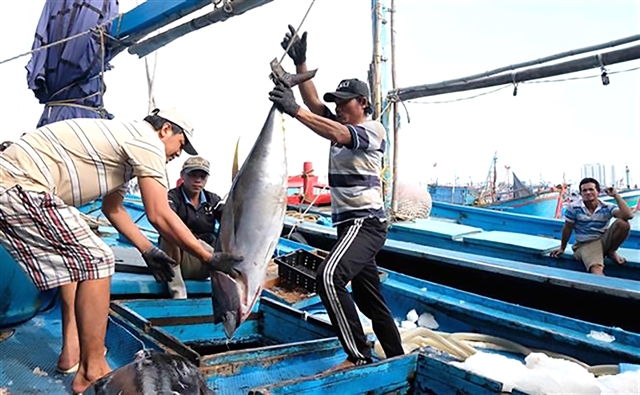 Economy
Economy

 |
| Fishermen unload ocean tuna for consumption. — VNA/VNS Photo |
HÀ NỘI — The Việt Nam Association of Seafood Exporters and Producers (VASEP) said that the country's tuna exports to Halal markets such as the Middle East, Malaysia, Brunei are on the rise.
The association believes that the Halal market is a great opportunity for the tuna industry.
Specifically, the country's tuna exports to the Middle East have been on the rise in the past four years.
Export turnover to this market has increased from US$83 million in 2021 to $113 million last year, an increase of 35 per cent.
Although geopolitical instability has affected tuna exports to the Middle East market, this market block is still highly appreciated as a potential market for Vietnamese tuna.
Tuna exports to other Halal markets such as Malaysia and Brunei are also increasing, by 36 per cent and 24 per cent respectively last year.
Currently, more than two billion Muslims live in 112 countries and territories, accounting for 25 per cent of the world's population, concentrated in Asia (62 per cent), especially in the ASEAN bloc.
The Asia-Pacific region, home to the world's largest Muslim population, consumes more than 63 per cent of global Halal products, becoming the centre of this dynamic market.
With its strategic location, Việt Nam is considered an important gateway to penetrate this large market.
Strict Halal standards and complex certification systems are also significant challenges for businesses. To make it easier for Vietnamese goods to access this market, the Việt Nam Trade Office in the United Arab Emirates (UAE) recommended that Việt Nam improve its legal system on Halal, including developing national standards and certification processes in line with international requirements.
At the same time, the trade office suggested strengthening co-operation in the Halal field between Việt Nam and the UAE, especially the issuance of certificates according to UAE Halal standards.
It was forecast that Vietnamese Halal products would face fierce competition with similar products from countries with many years of experience and prestige in this field.
VASEP believes that Việt Nam needs to have specific supporting policies, including prioritising budget resources for production and certification, boosting trade promotion and training specialised human resources in Halal.
At the same time, there needs to be reputable intermediary organisations to help businesses in the certification process and comply with regulations in export markets.
Regarding this issue, Prime Minister Phạm Minh Chính requested the Ministry of Industry and Trade (MoIT) and the Ministry of Foreign Affairs (MoF), according to their assigned functions and tasks, to do research into developing a plan to promote Halal food exports.
"This will be an opportunity for Vietnamese tuna businesses to expand their export markets in the context of difficulties in exporting to major markets such as the US and EU," noted VASEP. — VNS




